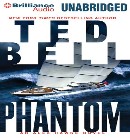AUDIO BOOK REVIEWS
by Jonathan Lowe
 Alex Hawke is
back, after Tsar and Warlord, in PHANTOM.
Plot involves a brazen Siberian rescue attempt against a seemingly
impenetrable KGB facility, and a cyber attack against America
using what may be the first artificially intelligent super
computer. (An F15 jet falls out of the sky and a Disney World
ride goes awry for no apparent reason.) Author Ted Bell uses
his knowledge of internal Russian politics to craft a suspenseful
scenario of war perpetrated by a regime which wants to reassert
its former dominance through intimidation. (Currently it's
playing Iran as pawn, while attacking the West directly only
over the internet, as is China.) Narrator is actor
John Shea, who has to be one of the most unusual
readers in that he employs his considerable skills unraveling
the story in a low key, almost conspiratorial tone, as though
he's telling you the details over a cocktail in a dark and
dangerous bar, and might be overheard. This makes it difficult
to hear in a car, so I suggest listening with earphones while
doing something other than driving. Like maybe while planting
melons (domestic bombs) in a Victory garden, hoping this scenario
doesn't play out in real life? Or shopping at Wal Mart, noting
all the Chinese goods flooding America (utilizing its one
great weapon, cheap labor)? Alex Hawke is
back, after Tsar and Warlord, in PHANTOM.
Plot involves a brazen Siberian rescue attempt against a seemingly
impenetrable KGB facility, and a cyber attack against America
using what may be the first artificially intelligent super
computer. (An F15 jet falls out of the sky and a Disney World
ride goes awry for no apparent reason.) Author Ted Bell uses
his knowledge of internal Russian politics to craft a suspenseful
scenario of war perpetrated by a regime which wants to reassert
its former dominance through intimidation. (Currently it's
playing Iran as pawn, while attacking the West directly only
over the internet, as is China.) Narrator is actor
John Shea, who has to be one of the most unusual
readers in that he employs his considerable skills unraveling
the story in a low key, almost conspiratorial tone, as though
he's telling you the details over a cocktail in a dark and
dangerous bar, and might be overheard. This makes it difficult
to hear in a car, so I suggest listening with earphones while
doing something other than driving. Like maybe while planting
melons (domestic bombs) in a Victory garden, hoping this scenario
doesn't play out in real life? Or shopping at Wal Mart, noting
all the Chinese goods flooding America (utilizing its one
great weapon, cheap labor)? |
|
|
Neil Forsyth's hilarious collection of
email exchanges between various scam spammers and a man
who's had enough is a lesson in one-upsmanship. Narrated
by Cameron Stewart, whose British accent compliments
the text, DELETE
THIS AT YOUR PERIL is a must hear for anyone
imagining revenge against Nigerian phishes, Russian mail
order brides of Frankenstein, and other offers to good to
be true. Don't listen at your peril. |
|
|
Americans are addicted to TV. We watch on average six hours
a day. Not only does this cut into productivity, but it
isolates us and makes us more lonely, even as it presents
itself as a bright, happy alternative to facing real people
in the real world. In the essays A
Supposedly Fun Thing I'll Never Do Again the
late David Foster Wallace attempts to plumb
the whys of popular culture. These densely reasoned examinations
not only illuminate TV, but also director David Lynch, ocean
cruising, tennis, literary theory, and the Illinois State
Fair. Read with an empathic air by the always engaging
Paul Garcia, they reveal an insightful writer with
a facility for language and critical thought. And while
he fought depression, he also had a sense of humor and the
absurd. |
|
|
After deregulation ("free markets") caused disaster
in 2008 at the collapse, why are conservatives and the Tea
Party promoting it harder than ever? Thomas Frank makes
this analogy, narrating his ironic look at the delusions
of politics, PITY
THE BILLIONAIRE: "It's as if the French
Revolution is occurring in reverse, with people demanding
that the nobility be given more money and privileges."
The author brings to bear many observations made about pundits
and journalists on both the right and the left, trying to
sort out the reasons behind the enigma of doublethink. While
many on the right, most notably Rush Limbaugh and Glenn
Beck, say they are against big government for the sake of
the little guy, the very regulations they oppose (also opposed
by big business) serves only to force the little guy to
pay for big business (and big government's) mistakes. The
two feed off each other, with greed the winner over sanity.
Frank hits a lot of nails in his book, fearful that the
zombies he's trying to imprison will somehow rise again
from their coffins. |
|
|
Finally, Donna M. Johnson's memoir HOLY
GHOST GIRL chronicles her experience as child
to a mother who became evangelical evangelist David Terrell's
mistress. The book is both honest and puzzling, as the author
contemplates the motives of a man whose life was an enigma.
Tent meetings across a segregated America began with harsh
living conditions, as she traveled with her mother on the
ministry's circuit, witnessing hell fire preaching, attempts
at healing, and the odd hypocritical philosophy that made
the "man of God" kneel in prayer even in private,
yet justify his indiscretions at every turn. As the ministry
grew, what was formerly a struggle turned profitable, with
greed and tax evasion on its heels. Carrington MacDuffie
narrates this coming of age story with appropriate
naivete in her tone, as Johnson eventually broke away from
the life, first with rebellion, and finally with a sense
of peace, if not understanding. |
|